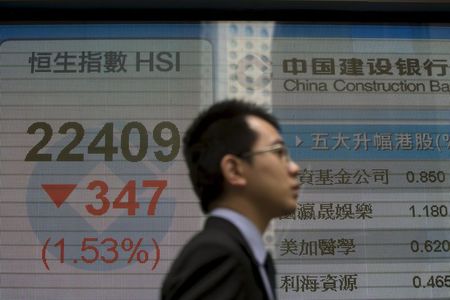
Investing.com– Most Asian shares fell on Tuesday as uncertainty over rates of interest and the U.S. presidential election stored merchants largely risk-averse, whereas Chinese language markets drifted increased after an rate of interest reduce.
Regional markets took a weak lead-in from Wall Avenue, as U.S. inventory benchmarks retreated from report highs as Treasury yields rose and because the earnings season loomed.
U.S. inventory index futures had been mildly damaging in Asian commerce.
Buyers had been now largely awaiting the U.S. presidential elections, that are nearly two weeks away. Republican nominee Donald Trump was seen gaining higher odds in opposition to Vice President Kamala Harris in latest polls.
Focus this week was additionally on a string of key U.S. earnings, with Asian earnings set to choose up within the coming weeks.
Japan’s Nikkei leads losses regardless of yen weak spot
Japan’s was the worst performer in Asia, dropping 1.7%, whereas the index shed 1.1%.
Losses in Japanese shares got here even because the touched its weakest degree in practically three months, because the foreign money was pressured by uncertainty over the Financial institution of Japan’s capability to lift rates of interest additional. A weaker yen normally advantages export-oriented Japanese shares.
Japanese basic elections are set to happen later this month, whereas the BOJ is ready to fulfill on the finish of October.
Earlier than that, is due later this week and is prone to issue into the outlook for Japanese rates of interest.
Broader Asian shares retreated. South Korea’s misplaced over 1%, whereas Australia’s shed 1.4%, with the latter seeing heavy profit-taking after hitting report highs earlier in October.
Futures for India’s index pointed to a flat open, because the index misplaced floor amid profit-taking and a few middling earnings from main Indian firms.
Chinese language shares advance after charge reduce
Chinese language markets had been the only real shiny spot in Asia, with the and indexes rising between 0.2% and 0.3% in uneven commerce. Hong Kong’s index added 0.4%.
Chinese language shares took some cheer from a barely bigger-than-expected reduce to the Folks’s Financial institution of China’s benchmark on Monday.
The speed reduce got here as the most recent in a flurry of latest stimulus measures from Beijing to shore up financial development.
Whereas optimism over the measures initially drove Chinese language markets to two-year highs in October, doubts over the timing and scale of the measures pulled Chinese language shares off these peaks.




